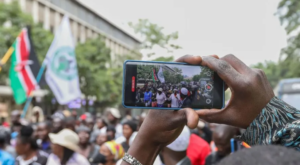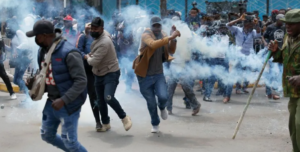The political landscape has been profoundly impacted by the extraordinary upsurge in the number of young protestors that have been seen in the recent events that took place in Nairobi, Kenya. What began as dissatisfaction expressed on TikTok on a controversial finance bill quickly became a powerful movement that was independent of established political organizations.
William Ruto led a government that had traditionally been split along racial and political lines, but under his leadership, the populace came together in record numbers to protest what they saw as unfair taxes. In a spectacular show last Tuesday, hundreds of protestors—mostly wearing sneakers and carrying cellphones—braved police resistance to march through Nairobi’s busy central business area. Live coverage of their disobedience garnered support and attention from all around the world.
The demonstration, which went under the name “occupy parliament,” was mainly organized on social media, shunning the conventional leadership structures that are common to political groups. Using social media sites such as TikTok, organizers rallied friends to wear black in symbolic opposition. The sheer volume of participants revealed a pervasive discontent among Kenya’s Generation Z, who were determined to convert their online activism into a real-world presence on the streets.

Many protesters live-streamed from the anti-tax march
“I work as a slave here for my beloved nation. Like many first-time protestors, 24-year-old student Ken Makilya said, “It’s the first time I’m doing this because my parents are old and they cannot do it any more.”
The demonstrators’ tenacity was bolstered by a shared will to be heard, even in the face of police pushback that included the use of water cannons and tear gas. Using hashtags like “#OccupyParliament” and “#RejectFinanceBill2024” strategically helped them spread their message and directly target lawmakers with huge SMS campaigns that bombarded MPs’ phones with requests to reject bills.
The impact of the demonstration was evident, and the president acted quickly to address it. Important elements of the controversial budget measure, including a planned 16% VAT on necessities like bread, were removed in a matter of hours. The activists’ noteworthy triumph was validated by this capitulation, which affirmed their non-traditional advocacy strategy.
The late Chief Justice Dr. Willy Mutunga observed that these youth-led protests have a worldwide impact and advised governments not to underestimate the influence of young people who have taken up cause. This protest’s uniqueness was further highlighted by the absence of traditional loyalties, as participants went beyond political and ethnic lines to pursue a shared goal.

Police used tear gas and water cannon to stop the protesters reaching parliament
Looking ahead, the ongoing discussion in Parliament about the amended finance bill highlights the difficulties that still need to be overcome in order to bring about long-lasting reform. In this changing political environment marked by a growing culture of digital activism, the influence of platforms such as TikTok on public conversation is significant. These changes highlight a paradigm shift in the way that grassroots groups organize and use their power in a globalized society.
The events of June 18, 2024, serve as a witness to the strength of group action and the changing nature of citizen engagement in the internet age as Kenya navigates this new chapter in its political narrative. Kenya’s youth voice has unquestionably made a lasting impression on the country’s political conscience, with protest sounds echoing across social media and traditional news sources equally.



















